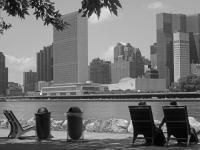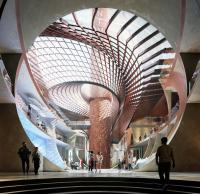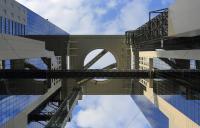Service Center of Peony Performance Park
Fuzhou, China
This design takes the historical script of Peony Pavilion drama as the background, meanwhile, considers the director’s demand for drama arrangement to reflect the way that traditional materials are reproduced in contemporary cultural context. Therefore, taking “the new Chinese style” as the leading idea, consider how to evolve the traditional elements for today, to evoke memories of the past without losing the contemporary. As a connecting node from the modern city into the virtual performance park.
In the context of rapid change, we will selectively pick up mainstream and fundamental awareness and continue. Architecture as a medium to express the relationship between human and nature has not only been emphasized by the ancients, but also today we are still following and longing for it. In this desire, we re-recognize this medium and update them. As a long-established traditional architecture, wooden structural building and courtyard lifestyle, we can continue this memory in terms of structure and space today.
It’s the extension of the historical street of Wencangli, and next to the main road and Fu river and residence area. However, the whole performance park is quite excusive zone, which is fenced by walls and buildings from city. So the project is more like a packed gift of the city. In this site, different type of program can place themselves and demonstrate their own character.
The architectural layout of the service centre is aimed at the spatial characteristics of the four main functional blocks (tourist centre, office, rehearsal hall and dormitory): the tourist centre is an open public space, the office is a closed public space, the dormitory is a closed private space, the rehearsal hall is kind of in-between space. we use tourist centre and dormitory and office to form an “U” shape layout in order to compose a courtyard kind of introversive space for rehearsal halls. At the same time, taking an account for the original preserved building, and the line of the view of the conference, which is a part of the office, is result in two spatial control lines of “U” and “I” shape.
Under these two control lines, the visitor center is arranged in conjunction with the preserved building (museum) to connect the entrance square and the entrance of the performance park with a narrow exhibition corridor. The office part is next to exhibition corridor and set on the south side of the site so that the conference reception can get a better view. While the more intimate part – dormitory – is lined up with the north side. In the center of them, it’s a courtyard space which takes on the program of rehearsal, there are three free standing rehearsal halls.
Based on the form of the traditional wood structure, the “Y” shape is evolved. The two type structure units are re-used to produce a unique feature to the design.
In the dormitory design, we use the traditional structure and the “Y” shape structure to create a honeycomb frame structure. We have four sets of dormitory space scattered on the honeycomb structure frame. Leaving a common space between these four parts as a transportation space.
In office design, we use the traditional structure and the “Y” shape structure to create a freer three-dimensional tree structure. The office space with different characteristics is distributed to different structural frameworks.
- Arquitectos
- beyondtime architects
- Localização
- No.60 Dachuanchang, 344000 Fuzhou, China
- Ano
- 2019























